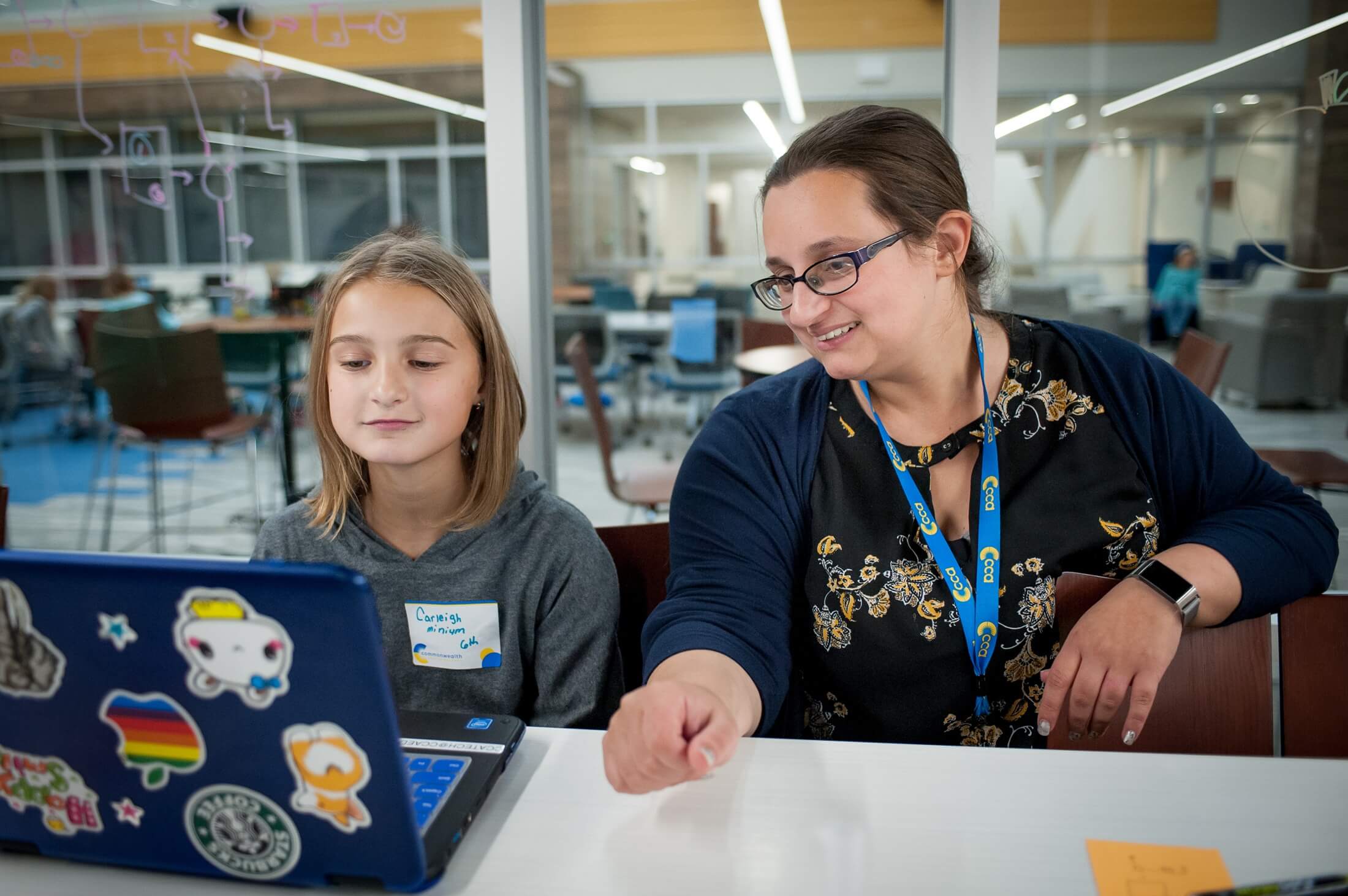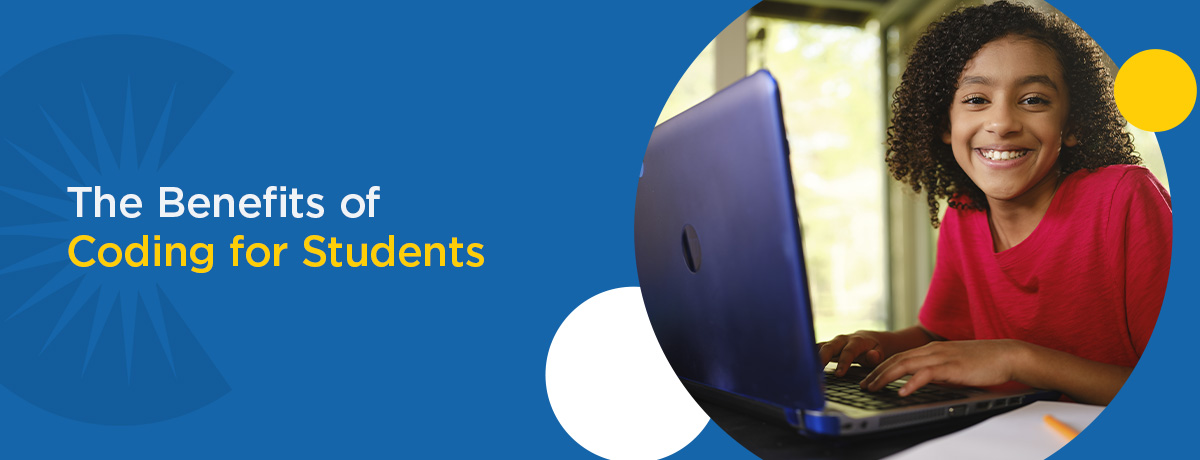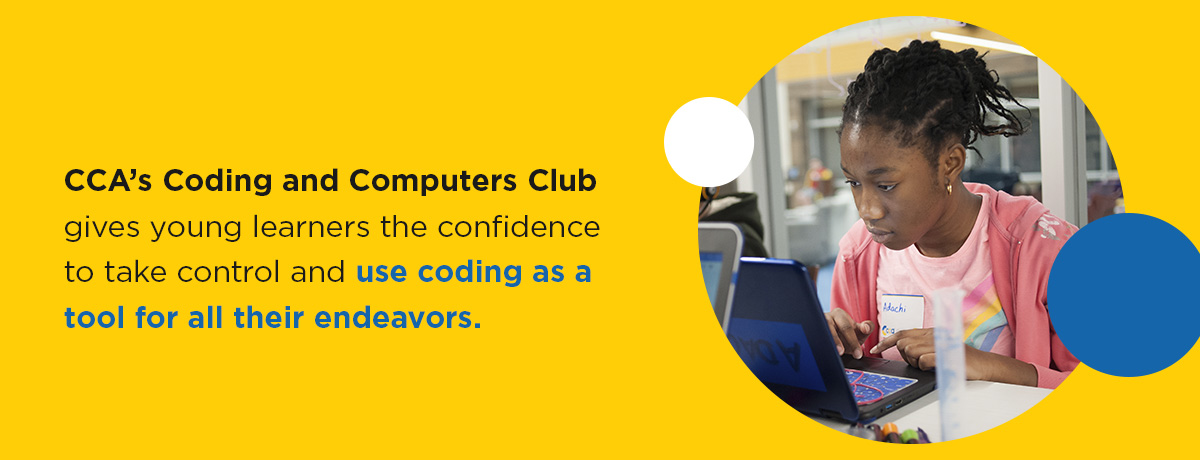Enrollment Now Open for Second Semester. Click Here
Enrollment Now Open for Second Semester. Click Here


Today’s children grew up in a digital environment. From smartphones to tablets, kids have had access to the internet and technical devices for most of their lives. Understanding the codes behind web pages and applications has a distinct advantage. By learning to code, children can learn the full range of computer power for learning and careers.
Any child can, and should, learn to code — no special talents needed.
Coding and computer clubs are fun, engaging activities for teaching coding to kids in elementary through high school.Students learn how coding applies to a variety of fields, whether it’s agriculture, art, fashion, health care, education, or, of course, technology. Under the guidance of the clubs’ advisors, students explore software, hardware, coding, future career options, and more through fun and interactive activities.
Students learn many valuable life and career skills through coding. This activity teaches kids digital literacy and encourages success in our technological world. Coding also enhances soft skills like problem-solving and persistence. By empowering kids with the opportunity to try coding, they can reach new potential.
Here are eight benefits of coding for kids:
It’s said that 85% of jobs expected by 2030 haven’t been invented yet. Could your child become an organ creator, saving lives by building hearts and kidneys? An earthquake forecaster? A mechanic for self-driving cars? A “rewilder,” helping nature reclaim abandoned factory sites?
All of these job paths relate to the science, technology, engineering, and math (STEM)skills that are essential for our modern world. Students learn about the programming behind essential tools and software.
For instance, coding teaches computational thinking. This style expresses and solves problems in a computer-like manner. Students break down problems into smaller pieces and observe underlying processes. Kids with computational ability can understand algorithms more closely, which are essential components for many professional tools.
Every child is creative. Whether they pretend a toy dinosaur is real or transform the living room into a fort, they look at the world through an imaginative lens.
Creativity is essential for many careers and personal challenges throughout life. Employers value workers who solve problems and propose new ideas. Creativity allows you to explore the world in an exciting way, making it important to nurture the skill beyond childhood.
Learning to code encourages creativity in the brain, nurturing it for the rest of kids’ lives. They can link their artistic right brain with their logical and technical left brain — by combining these two halves, kids can apply creativity to technical pursuits.
Logical thinking is crucial for successful coding. Computers follow instructions exactly, so it’s essential to input precise directions. Kids canbreak down problems step by step, which allows them to think deeply. You can apply logical thinking to many life areas, and learning coding prepares students to develop these skills early.
Problem-solving is essential for many environments. It teaches persistence, showing kids the value of resolving problems instead of giving up when things get hard. As children learn to code, they apply processing skills toward a workable solution.Kids coding classes encourage students to recognize problems and use their creativity and skills to solve them. Probelm-solving also builds confidence, encouraging students to continue to push through challenges.
Collaboration is more important than ever. Institutions worldwide rely on sharing ideas and teamwork. No matter what career field kids choose, communication will play an important role in their success. Computer coding for kids allows them to solve problems, share ideas, persist through failures, and celebrate successes. They work together and challenge themselves in a safe environment. After resolving problems together, they fully understand teamwork’s importance.
Coding also displays the importance of structure to kids. Structure is crucial for child development— kids feel more secure when they know what to expect each day. Encouraging rules and routine introduces kids to a safe and predictable life. They learn to trust in the adults and systems around them.
By studying coding, kids learn to evaluate patterns and internal structures. They can view web page and application structures, understanding how these patterns contribute to a larger design. That way, students see the value of frameworks and how these structures build larger, more cohesive environments. They can apply these lessons to life and remain curious about the many systems around them.
Persistence is a vital life skill, empowering people to keep striving for goals after failure or setbacks. Because coding is complex, most kids won’t master it on the first try, and that’s completely expected. New concepts take time to understand, and students will need to try over and over to reach success. When they reach their goal, students can feel proud and invigorated by their persistence.
Instead of focusing on themselves, kids become absorbed by coding problems. Their confidence rises after they solve the problem because they learn to value their own abilities. By teaching kids the value of determination and how it leads to success, they can apply these lessons to adulthood.
Failure is a healthy and necessary part of learning. Instead of fearing it, kids should embrace it as part of their learning process. After all, you learn much more from failure than from success. It teaches students to build determination and ambition.
Coding provides many opportunities to fail and try again. Kids can learn that failure isn’t final, and there are always opportunities to move forward and try new strategies. Learning these lessons early helps prepare kids for challenging situations later in life.
As children grow up, learning to code offers different levels of skill-building that make it fun and engaging. Here is a closer look at how coding impacts each grade level:

Technology is integrated into every aspect of our lives. CCA’s Coding and Computers clubs give young learners the confidence to take control and use coding as a tool for all their endeavors. TechWorks at CCA® gives students hands-on experience in several technology areas, including computer programming, advanced manufacturing, drones, and robotics.
Students who take advantage of this program can learn about web development, artificial intelligence (AI), and many other computer-based activities for unparalleled career preparation experiences.
Our clubs provide opportunities for social and digital development. Kids can bond with like-minded students and work through online coding problems together. They learn to collaborate through virtual and in-person environments, which teaches the importance of communication for different platforms. Students build digital literacy by practicing coding in hands-on environments. They can also boost their transcripts by adding this club experience.
Learning to code opens many career pathways for kids. Coding is the foundation for many aspects of digital technology, from software to mobile applications to video games. Many job fields use coding in everyday responsibilities, including:
Coding-based jobs are also in demand — the Bureau of Labor Statistics anticipates that computer and information systems manager jobs will grow 17% in the next few years. Computer science professionals can expect to earn between $88,000 to $192,000, allowing for high earning potential.
These jobs seek skills like:
By learning coding early, kids can experience the necessary skill development to succeed in these careers. In addition to technical knowledge, soft skills are essential for success in the professional world. Kids can learn the value of teamwork, make crucial decisions, manage stress, and refine other important soft skills.CCA’s Coding and Computers Clubs allow students to work on both hard and soft skills.
At CCA, learning isn’t restricted to the boundaries of a classroom. We encourage children to explore their interests as they open their minds to worlds of knowledge, fun, and career possibilities. It’s all part of CCA’s personalized learning, accommodating each child’s unique learning style and talents.
CCA’s dozens of clubs and extracurricular opportunities appeal to students with a wide variety of interests across the arts, literature, science and computers, math, and volunteering and community service. With the flexibility of CCA’s online learning and less time wasted on brick-and-mortar necessities, our learners have more time to enjoy multiple extracurricular activities. Our clubs introduce students to new pursuits and to each other as they build friendships and plot their paths toward lifetime success.
Enrollment Now Open for Second Semester. Click Here